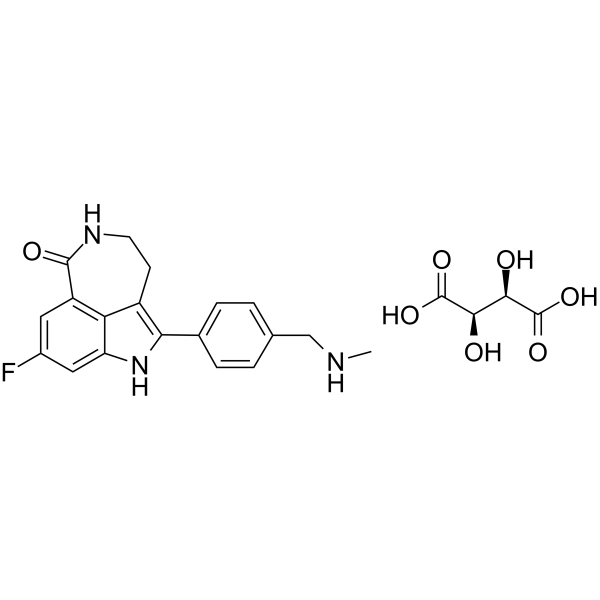773059-22-6
| Name | Rucaparib tartrate |
|---|
| Description | Rucaparib (AG014699) tartrate is an orally active, potent inhibitor of PARP proteins (PARP-1, PARP-2 and PARP-3) with a Ki of 1.4 nM for PARP1. Rucaparib tartrate is a modest hexose-6-phosphate dehydrogenase (H6PD) inhibitor. Rucaparib tartrate has the potential for castration-resistant prostate cancer (CRPC) research[1][2][3][4]. |
|---|---|
| Related Catalog | |
| Target |
PARP-1:1.4 nM (Ki) PARP-2 PARP-3 |
| In Vitro | Rucaparib (AG014699) tartrate is a possible N-demethylation metabolite of AG14644[1]. Rucaparib (0.1, 1, 10, 100 μM; 24 hours) tartrate is cytotoxic and has the LC50 being 5 μM in Capan-1 (BRCA2 mutant) cells and only 100 nM in MX-1 (BRCA1 mutant) cells[2]. The radio-sensitization by Rucaparib tartrate is due to downstream inhibition of activation of NF-κB, and is independent of SSB repair inhibition. Rucaparib tartrate can target NF-κB activated by DNA damage and overcome toxicity observed with classical NF-κB inhibitors without compromising other vital inflammatory functions[5]. Rucaparib tartrate inhibits PARP-1 activity by 97.1% at a concentration of 1 μM in permeabilised D283Med cells[6]. |
| In Vivo | Rucaparib (AG014699) tartrate and AG14584 significantly increase Temozolomide toxicity. Rucaparib (1 mg/kg) tartrate significantly increases Temozolomide-induced body weight loss. Rucaparib (0.1 mg/kg) tartrate esults in a 50% increase in the temozolomide-induced tumor growth delay[1]. Rucaparib (10 mg/kg for i.p. or 50, 150 mg/kg for p.o.; daily for 5 days per week for 6 weeks) tartrate significantly inhibits the growth of the tumor, and there is one complete tumor regression and two persistent partial regressions[2]. Rucaparib (150 mg/kg; p.o.; once per week for 6 weeks or three times per week for 6 weeks) tartrate has greatest antitumor effect with three complete regressions[2]. Rucaparib tartrate enhances the antitumor activity of temozolomide and indicates complete and sustained tumor regression in NB1691 and SHSY5Y xenografts[6]. |
| References |
[3]. Matt Shirley, et al. Rucaparib: A Review in Ovarian Cancer. Target Oncol. 2019 Apr;14(2):237-246. |
| Molecular Formula | C23H24FN3O7 |
|---|---|
| Molecular Weight | 473.45 |
